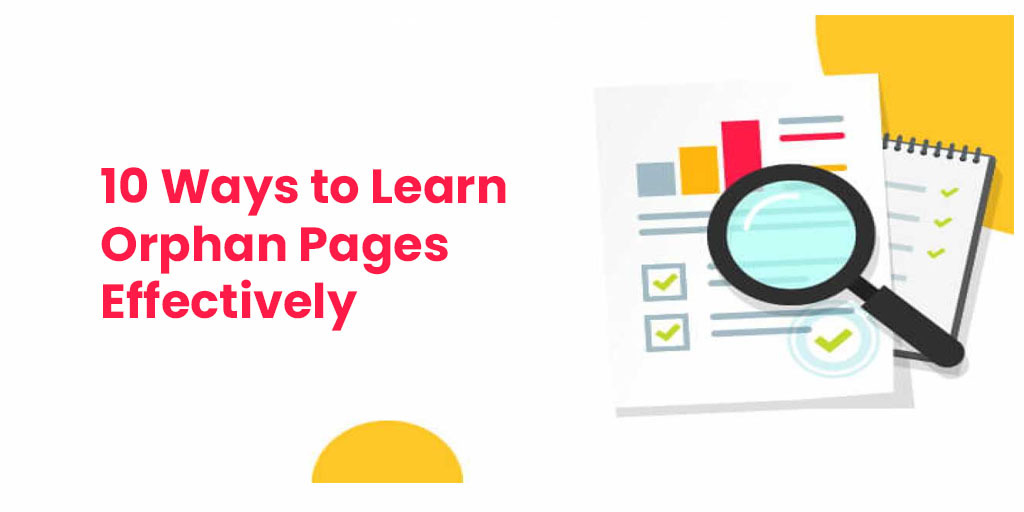It is recalled that Orphan pages can’t be indexed by search engines if they don’t show up in your sitemap and they can develop other SEO issues even if they do. Primarily a page without any links to it is called an orphan page. Finding web pages that have no links is difficult, but not impossible. If there are pages on your website that users and search engines can’t reach, this is a problem you require to fix.
It is enumerated that a page without any links to it is called an orphan page. Search engines, like Google, usually find new pages in one of two ways:
- The crawler follows a link from another page.
- The crawler finds the URL listed in your XML sitemap.
So if you wish Google to crawl and index your page, they need to be able to find it.
Moreover, the Search engines can’t find orphan pages through links, so orphan pages often go un-indexed and never show up in search results. Even if your orphan pages are listed in your XML sitemap, they are still a problem for SEO.
Are Orphan Pages Bad?
Orphan pages aren’t that much great for either users or crawlers. The users can’t reach those pages through your site’s natural structure so if there’s important or useful information on those pages, it’s wasted. This can develop a disappointing user experience.
Thereby with no internal links, no authority is passed to the pages, and search engines have no semantic or structural context in which to evaluate the page. So without any way of knowing where the page fits into your site as a whole, it can be harder to determine which queries the page is relevant for.
Orphan vs. Dead End Pages
As it is been established, an orphan page is a webpage that isn’t linked to by, or reachable from, any other page on the same website. In addition a dead-end page, on the other hand, is a webpage that doesn’t link to any other internal webpages or any external websites, thus developing a “dead end.”
When users land on this page, they can either hit back or just abandon the site. When search engine crawlers land on the page, they have nowhere to go, and no link equity can be passed. Today, with so many templates and themes available, it’s more difficult to create a dead-end – but hardly impossible. A dead-end can simply be remedied by adding links to your on-page content or making sure that sidebar or footer navigation is populated on every page.

Best to Identify Your Crawlable Pages
The uses need a list of all of the URLs that currently can be reached by crawling your site’s links. Also, you will need your own crawler – and SEO spider, to do this. Screaming Frog is a good choice.
Whatever crawler you use, make sure it is set to crawl only pages that are indexable by search engines. Thereby it should not crawl pages that are:
- Noindexed
- Hidden from search engines by robots.txt.
Begin the crawl from the homepage of the site. Also make sure to use the canonical URL, including proper HTTPS or HTTP, and www or non-www.
You must Resolve 2 Common Causes of Orphan Pages
You have two common causes of orphan pages that should be immediately addressed and dealt with. Both these causes are key page duplicates that should automatically redirect consistently to only one URL.
In case if they don’t, it’s likely that some versions of the page are not linked to and as a result are orphans. In this case, the fact that they are orphans isn’t the primary issue, the fact that they are duplicates is. These may come up later while you are searching for orphan pages, and need to be dealt with, so it’s a novel idea to get them out of the way beforehand.
Non-Canonical https/http or www/non-www
Primarily every public page on your site should ideally use HTTP or HTTPS consistently preferably HTTPS, and www or non-www consistently. To check if this is the actual case, try typing all of these variations of your site’s homepage into your browser:
- https://www.instance.com
- http://www. instance.com
- https:// instance.com
- http:// instance.com
So thereby all four variations should redirect automatically to the exact same URL. For consistency, that page should be canonical to itself. If one of these variations does not redirect properly, it can be a sign of similar problems on the wider site. Also check other URLs, using that variation, to see if it’s a more widespread issue. You must test a few other pages of your site, and check your site’s .htaccess file to make sure that redirects for these are set up properly.
Quality Places to Look for Orphan URLs
It is stated that you can repeat this process for identifying orphan URLs using data sources other than Google Analytics. Any of the following tools will have a list of pages crawled from your site:
- SEMrush
- Ahrefs
- Moz Link Explorer
- Raven Tools
Trailing Slashes
There is another key thing to watch out for is the consistent use of trailing slashes. For example, these two URLs may produce the same content, but the URLs are not identical:
- https:// instance.com/page1/
- https:// instance.com/page1
Also check a few pages on your site both with and without the trailing slash, and make sure that they redirect automatically to the same URL, and that they do so consistently. In addition, verify that this is set up properly in .htaccess.
GegoSoft is the best IT Services Provider in Madurai. We offer Cheap Web Hosting Services and also do web development services. Ready to work with reliable – Digital Marketing Services in Madurai
Our Success Teams are happy to help you.
We hope to enjoy you reading this blog post. Till you have any queries call our expert teams. Go ahead Schedule your Meeting talk with our experts to consult more.

